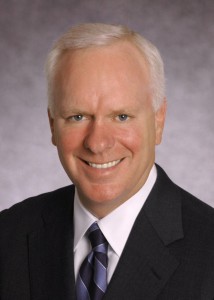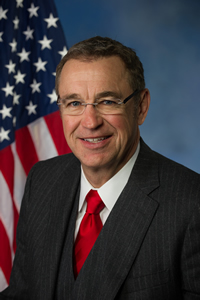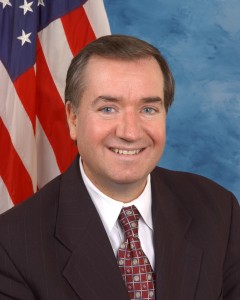WASHINGTON – The Broadcasting Board of Governors (BBG), the independent federal government agency that oversees all U.S. civilian international media, today announced the appointment of John Lansing as Chief Executive Officer and Director of the BBG. Lansing will begin his service at the BBG in September.
Lansing joins the BBG with nine years of experience as President of Scripps Networks, where he is credited with guiding the company to become a leading developer of unique content across various media platforms including television, digital, mobile and publishing. As President of Scripps Networks, Lansing was responsible for strategic and operational oversight of the $2.5 billion division of Scripps Networks Interactive, including the company’s portfolio of six cable networks – Food Network, HGTV, Travel Channel, DIY, Cooking Channel and Great American Country – and the $100 million Scripps Networks Digital division. Prior to joining Scripps Networks in 2004, Lansing was Senior Vice President for Television in the broadcasting division of the E.W. Scripps Company, managing the company’s portfolio of 10 network affiliated television stations. Earlier, he held various senior management positions at Scripps-owned affiliates, including WEWS TV in Cleveland, Ohio and WXYZ TV in Detroit, Michigan.
Most recently, Lansing was President and Chief Executive Officer of Cable & Telecommunications Association for Marketing (CTAM), a marketing association comprised of 90 of the top U.S. and Canadian cable companies and television programmers. There, Lansing oversaw the development of business strategies and marketing initiatives that position cable television companies for continued growth as they compete with emerging digital content platforms.
Lansing also brings a deep understanding of journalism from roles as an award-winning Photojournalist and Field Producer, Assignment Manager, Managing Editor, and News Director at several television stations earlier in his career.
Lansing is currently Vice Chair of the Bellarmine University Board of Trustees and was named to the Bellarmine Gallery of Distinguished Graduates in 2010. He serves on the National Advisory Board of the Bellarmine University’s Institute for Media, Culture & Ethics; National Council for Media and Public Affairs of George Washington University School of Media & Public Affairs; and, until recently, the Poynter Institute for Media Studies Foundation, one of the nation’s top schools for professional journalists.
“John is a proven executive and a remarkable, transformative leader in multiplatform content strategies, development and distribution,” said BBG Chairman Jeff Shell. “With his journalistic sensibilities and success in leading media companies through periods of challenges and growth, John is the ideal person to lead the BBG as we accelerate efforts to shape a global, world-leading media organization that is up to the challenges of the 21st century.”
“We are very fortunate to have John take on the CEO role at this critical time when U.S. international media is on the front line of the United States’ most important and complicated foreign policy issues,” added Shell. “From eastern Ukraine to China to ISIL and Iran, the programming of the BBG is the most important, and in many cases, the only voice of honest and open journalism. John also understands that conveying and critically assessing official U.S. policy is a key component of BBG’s mission. American leadership in the world depends in part on international audiences knowing where the United States stands with respect to their countries and the issues that affect them.”
“I thank Chairman Shell and the Board for this opportunity to help lead this fantastic organization,” said Lansing. “As one of the world’s largest media enterprises, the BBG provides balanced, reliable and authoritative news in the face of partisan media and heavy propaganda from repressive nations and extremist groups. I am honored to enter into public service and to join a team of world class journalists and media professionals who are dedicated to expanding freedom of information and expression worldwide. I also welcome the opportunity to work with this distinguished Board, which has steadily guided the BBG forward.”
Chairman Shell also thanked André Mendes for his service as BBG Interim CEO. “On behalf of the entire Board, I would like to express our deep appreciation for the tireless work of André and his dedicated team. During this transition period, André and his colleagues have worked diligently to produce outstanding results and to spur on forward momentum at the BBG.”
BBG’s Critical Importance in a Fragmented World and Rapidly Changing Media Environment
U.S. International Media (USIM) operates today in a challenging environment in which global audiences have vastly increased access to information from both public and private sources and in which modes of communication are changing in fundamental ways.
The global information space has become a battleground, where new international actors have “weaponized” information to try to undermine not only Western values but also Western resolve to confront the challenges of the 21st century. The emergence of well-funded state-sponsored broadcasters have demonstrated how propaganda can directly influence events on the ground. Elsewhere, non-state actors including al-Qaeda, ISIL and Boko Harem are using social media to recruit fighters and sow fear.
The BBG is sparing no effort to bring global audiences alternative narratives – built on accurate, fact-based journalism – to foreign propaganda in Ukraine and across the former Soviet Union as well as in the Middle East, South Asia and the African Sahel. MBN’s Raise Your Voice, an interactive audience engagement initiative on TV and radio in Iraq exemplifies BBG’s response, empowering moderate secular and religious voices to discuss the root causes of ISIL while providing Iraqi leaders with constructive feedback on the lives and hopes of the Iraqi people.
Gallup research underscores impressive results, most notably where extremism is a palpable threat; BBG networks boast weekly adult audiences of 44% in Iraq, 53% in Afghanistan, 28% in Iran, 51% in Somalia, and 18% in Nigeria. Globally, BBG networks increasingly are engaging new audiences, reporting on issues of human rights, government corruption and other issues, which contributes toward an all-time high measured BBG weekly audiences in excess of 215 million and rapid growth across all media platforms including social media and mobile.
Telling America’s story is a significant part of BBG’s statutory mandate. BBG covers the United States in all of its complexity, reflecting the nation’s democratic process, so that the countries that are struggling to nurture their own democratic systems might learn from the American experience.
BBG has also developed a robust portfolio in Internet anti-censorship. The agency focuses not only on disseminating content, but also on expanding access to the Internet, and offering to citizen and professional journalists the tools to report safely without detection by government surveillance. Increasingly, this work is important in countries such as China, Venezuela and Iran that are bolstering their firewalls to stop the free flow of information.
About The Broadcasting Board of Governors
The Broadcasting Board of Governors is the independent federal government agency that oversees all U.S. international media. BBG is also the name of the board that governs the agency.
The BBG Board is focused on how to best leverage the combined power of the five media networks it oversees – Voice of America (VOA), Radio and TV Martí, Radio Free Europe/Radio Liberty (RFE/RL), Radio Free Asia (RFA), and the Middle East Broadcasting Networks (MBN) – in countries where vital U.S. interests are at stake and freedom of the press and freedom of expression are under attack.
All current BBG Board members have been confirmed by the U.S. Senate to their positions since August 2013. Board members are well-respected leaders in U.S. foreign policy, media, and government and operate in a collegial bi-partisan manner.
Current Board members include: Jeff Shell, Chairman of Universal Filmed Entertainment; Matthew Armstrong, author and former Executive Director of the U.S. Advisory Commission on Public Diplomacy; Dr. Leon Aron, Resident Scholar and Director of Russian Studies at the American Enterprise Institute; Ambassador Ryan Crocker, Dean of the Bush School of Government and Public Service at Texas A&M University, whose 37-year career in the U.S. Foreign Service included service as U.S. Ambassador to Afghanistan, Iraq, Pakistan, Syria, Kuwait, and Lebanon; Michael Kempner, founder, president, and CEO of MWW, one of the world’s top five independent public relations agencies; Ambassador Karen Kornbluh, Executive Vice President of External Affairs for Nielsen and former U.S. Ambassador to the Organization for Economic Co-operation and Development (OECD); and Kenneth Weinstein, President and CEO of the Hudson Institute. Secretary of State John Kerry is represented on the Board by Under Secretary of State for Public Diplomacy and Public Affairs Richard Stengel, former managing editor of TIME.







